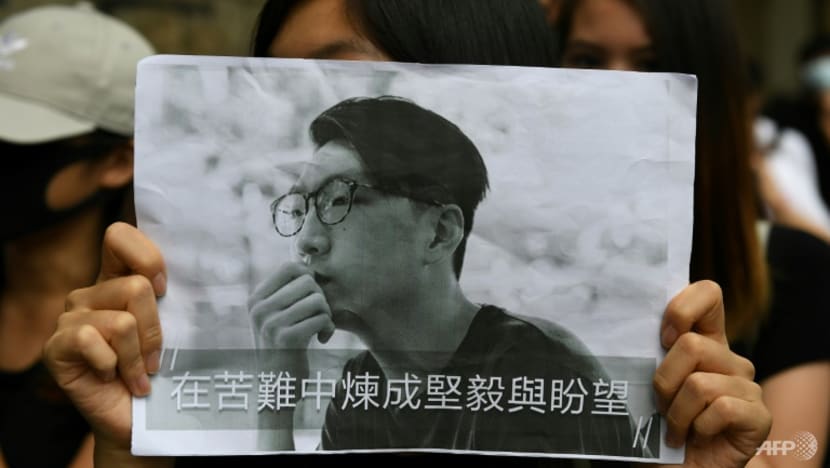Hong Kong independence activist Edward Leung released from jail

A demonstrator holds up placard with a photo of activist Edward Leung. (Photo: AFP/Mohd Rasfan)
HONG KONG: Hong Kong independence activist Edward Leung Tin-kei, whose now-banned slogan became a rallying cry during the 2019 pro-democracy movement, was released from jail in the pre-dawn hours of Wednesday (Jan 19) after serving nearly four years.
Leung, 30, was the face of localist group Hong Kong Indigenous and a rising star on the political scene as a fledgling pro-independence movement gained momentum in 2016.
But his ascent was cut short two years later when he was jailed for rioting and assaulting police during a 2016 protest, which saw demonstrators hurling bricks and setting rubbish alight in Hong Kong's commercial district Mong Kok.
While Leung was kept in a maximum-security prison, his election campaign slogan - "Liberate Hong Kong, revolution of our times" - gained prominence as protesters in 2019 took it up as a cry of resistance against China's rule.
The chant - ubiquitous during the huge and at times violent pro-democracy rallies which convulsed the city - was criminalised last year under a sweeping national security law Beijing imposed on Hong Kong to stamp out dissent.
Leung was expected to leave Shek Pik prison during Wednesday's working hours, but officials confirmed he was released under the cover of darkness in the pre-dawn hours.
"The Correctional Services Department has taken corresponding measures to arrange for the person in custody concerned to be released from Shek Pik Prison in the small hours," Hong Kong's prisons department told AFP in an email.
That was done taking "into consideration the wish and safety of the person in custody".
Leung posted on his official page around 5.45am that he has reunited with his family.
"After four years, I want to cherish the precious time I have with my family and restore a normal life. I would like to express my genuine gratitude for all your care," he wrote.
He added that he will "stay away from the spotlight and stop using social media", as he is under legal obligation to adhere to a "supervision order".
Leung's family had on Tuesday urged the public not to gather at the prison for the activist's release.
Weeks before, government sources had told local media that Leung is "likely to be watched" as authorities are wary of his influence in the now-smothered pro-independence camp.
METEORIC RISE AND FALL
Born in the mainland Chinese city of Wuhan in 1991, Leung is most recognised as one of the early faces of Hong Kong's pro-independence movement.
He was initially resented by mainstream democracy supporters for his staunch advocacy of Hong Kong's independence.
But his views gained popularity - particularly among the territory's younger generation - after the 79-day largely peaceful Occupy Movement in 2014 failed, with police forcefully clearing out protesters wielding batons and pepper spray in some instances.
Related:
The philosophy and political science student then joined Hong Kong Indigenous as its spokesman, and became the first pro-independence candidate running in a legislature by-election in 2016.
Despite losing, Leung got over 66,000 votes - widely seen as a show of rising support for the once-marginal movement.
He had remained largely silent during his time in prison - save for one open letter published in July 2019 when he urged protesters not to be blinded by hatred.
The missive was penned a week after a white-clad mob attacked dozens of passengers at Yuen Long train station with rattans and rods. Police were absent for about 40 minutes despite hundreds of emergency calls, which led to accusations of collusion with the pro-Beijing mob.
The Yuen Long station attack was a watershed moment in the 2019 protests, compounding already swirling animosity towards the police and heralding a dramatic increase in political violence.
Today, under the national security law which came into force in 2020, advocating for Hong Kong's separation from China carries a jail term of 10 years to life in prison.










